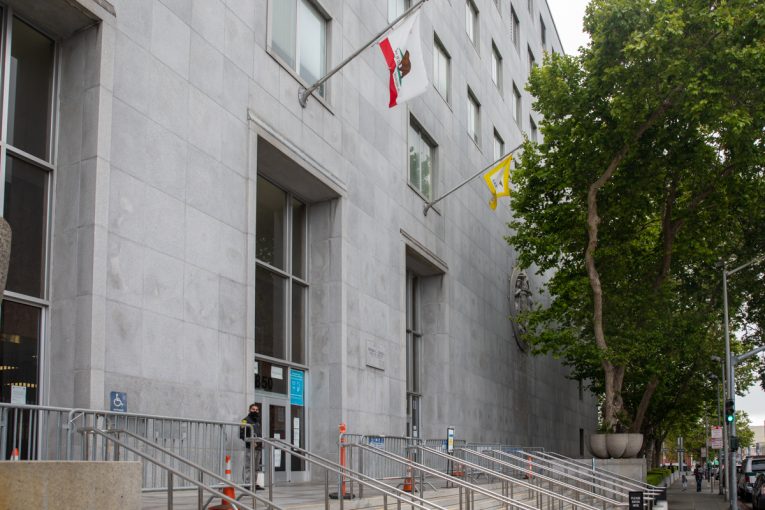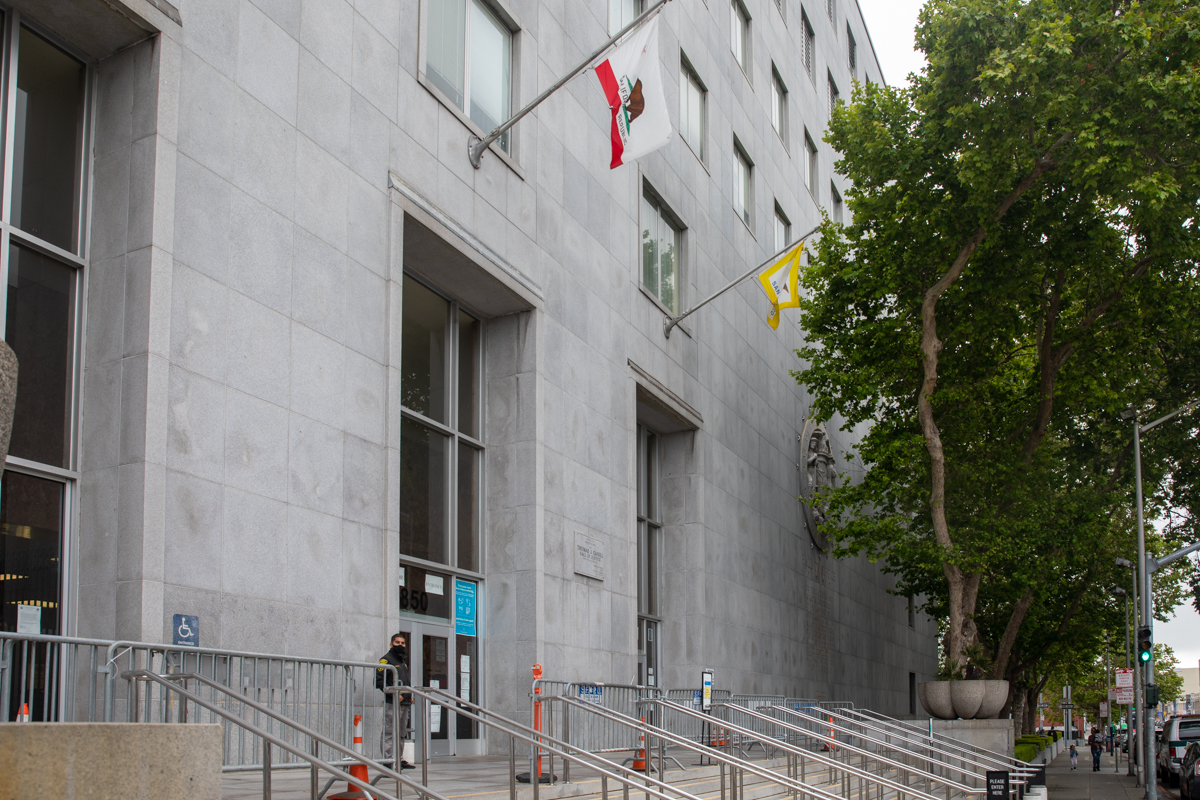

By Alana Bleimann and Tiffany Thai
SAN FRANCISCO, CA – San Francisco County Superior Court Judge Harry Dorfman reconvened the preliminary hearing of Sadat Fawzi Mousa this week, who is accused of violating a restraining order against his younger brother in a family domestic violence case.
Thursday morning’s preliminary hearing was a continuation of Wednesday afternoon’s hearing in which Deputy Public Defender Eric Fleischaker represented the defendant and Deputy District Attorney Melody Bahai represented the prosecution, charging 10 counts against Mousa for violating a restraining order against the victim, his younger brother.
Mousa is charged with four counts of stalking, stalking in violation of a court order to stay away from the victim, a felony for a criminal threat, and disobeying a court order.
The judge—who later set an Oct. 28 trial date—addressed the restraining order presented by Bahai, which was missing several pages.
Because the order was incomplete, Judge Dorfman stated that it “may be sufficient proof to show probable cause,” but wanted to hear arguments from both sides.
It was revealed that the protected party was Mousa’s younger brother, who at the time of the incidents was 16 years old. He is now 21 years old and took the stand Wednesday to lay out in detail the threats he was receiving.
Via text messages, Mousa’s younger brother was told the following statements:
“I will kill you,” “I will stick my fist up your ass,” “I’m going to kill you and eat you after I kill you” and “I will drink your blood and rape you.”
However, one main concern for Judge Dorfman was that these messages were received outside of the protective order’s jurisdiction.
At the time, Mousa’s brother was visiting Palestine but still held a permanent residence in San Francisco.
Judge Dorfman presented: Did the threatening text messages become a form of immediate harm? Are the threats credible if they were received outside of the jurisdiction?
There was no evidence in the case showing that Mousa knew when his brother would be returning to San Francisco from Palestine but once the brother got home, he found his property to be destroyed, allegedly by his brother, and the threats became more real.
He emphasized that both parties cannot be away from San Francisco for the restraining order to remain intact. The text messages made it unclear whether the texts were sent while any party was in San Francisco when the messages were sent, which was necessary for the purposes of the order.
If the threats were followed through once Mousa’s brother returned to the city, then, yes, they could be considered a form of immediate harm, the judge decided.
Judge Dorfman ruled that the incomplete order was still able to be used as evidence to support the charges because it clearly stated who was restrained and protected in the order.
Mousa was arrested after his younger brother called the police after returning home to find his belongings destroyed.
In his testimony on Wednesday, the younger brother stated that he called the police about Mousa out of fear and out of concern for Mousa’s mental health, both parties’ physical safety, and not wanting either party involved to go to jail.
Judge Dorfman noted that he did not find the younger brother’s testimony from Wednesday credible because the victim’s body language demonstrated he did not want to be there.
Notably, the victim responded to most questions with “I do not know,” and Bahai did not make an effort to help the victim recall what had happened.
Judge Dorfman noted that it appeared the brother did know the answers to the questions but was not being truthful to help Mousa’s case.
The testimony of the younger brother left an impression on Judge Dorfman that he did not want his brother to stay in jail, and gave his answers in a way that was favorable to Mousa.
DDA Bahai noted the brother’s testimony stated that Mousa has a “bigger bark than bite,” but often “a bark comes before the bite.”
Once both sides finished their preliminary arguments for the issues at hand, Judge Dorfman had a tough decision to make, commenting, “This is an interesting case.”
If the younger brother had lived in Palestine, not in San Francisco, then the outcome of the credibility of the threatening messages would have been different, Judge Dorfman concluded.
“The question for me… do I have enough information on the four pages [of the protective order[… I think the answer is yes, Mr. Fleischaker,” he said.
To prosecutor Bahai’s arguments, the protective order clearly states who the protected party is and “it’s illogical and impossible” that the previous judge from 2016 would give a protective order and then allow the defendant to break the order to make “credible threats.”
“I’m not prepared to say that Mr. Fleischaker’s interpretation is the only valuable one,” Judge Dorfman said.
The possible reduction of Counts 1 and 4 were then discussed.
PD Fleischaker requested both of these counts be reduced to a misdemeanor or disregarded completely.
Bahai argued Mousa has a current open assault case against a different brother, which has not seen a resolution yet.
To this, Judge Dorfman said, “There’s something going on here, whether it’s a mental health issue I don’t know, or whether it’s a violence issue I don’t know.”
PD Fleischaker reacted and argued that Mousa’s younger brother specifically testified on the stand that he does not want to see his brother go to prison and that his wishes should be taken into consideration, adding no actual harm was done in this case, only threats were made.
In fact, of the threats that were made “most of it doesn’t make sense,” Fleischaker noted to the judge. “I don’t think a strike or prison should be looming over his head,” Fleischaker added.
“I agree 50 percent with each lawyer,” Judge Dorfman stated jokingly, and reduced Count 4 to a misdemeanor but left Count 1 as a felony charge.
The parties then discussed Mousa’s custody status.
Fleischaker argued that he should be released, and if he is released, he will live with his 44-year-old sister in San Francisco. Additionally, Mousa would have an ankle monitor, have to stay 150 feet away from the protected parties, and be restricted from having any contact with his younger brother.
Importantly, PD Fleischaker noted that if mental health is a real issue in this case, Mousa should not be restricted to “a windowless box” 24/7.
On the other hand, DDA Bahai argued that Mousa should be held in custody with no bail, as he has presented himself as a safety issue to his brother and the general public.
Mousa’s sister had several children living with her, and Bahai raised a concern that the sister was not equipped to take care of another person.
Bahai also noted that in a recent court hearing, Mousa had random moments of “outbursts” that became “concerning behavior” for her. The actions in the previous court hearing was why the previous judge decided to not grant bail to the defendant.
If placed on an ankle monitor, prosecutor Bahai has “no faith that he will follow this court order” because nothing stopped him from breaking the protective order in the past.
“It seems like mental health is a real concern here,” Judge Dorfman noted, and asked both lawyers if they knew whether Mousa was prescribed medication for his mental health in jail, or if he was prescribed medication and did not want to take it.
Neither knew whether he was prescribed medication, but Mousa tried to answer the question but was advised by Fleischaker to stay quiet. Additionally, Judge Dorfman advised Mousa to stay quiet as well as “it was in his best interest.”
After hearing both sides, Judge Dorfman denied Fleischaker’s motion for Mousa’s release due to his mental health concerns and a potential public safety threat, adding, “People cut off their ankle monitors and go where they want to go.”
Following Judge Dorfman’s ruling on the charges, Mousa asked to represent himself in future proceedings, but Fleischaker quickly tried to stop him from talking.
The trial is set to begin on Oct. 28 in San Francisco County Superior Court.





